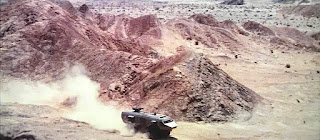
The director behind Your Name (2016), Children Who Chase Lost Voices (2011), 5 Centimeters Per Second (2007) and still my very favorite to date Voices Of A Distant Star (2002) not only directs and animates for beauty, but shoots to tug at the heartstrings. Shinkai loves to explore the emotional connections between people and the disconnected within the beautiful world around us. With Your Name, which I have yet to see, Shinkai has delivered his biggest hit to date. But the short Voices Of A Distant Star seems to strike just the right emotional balance with its narrative even if it's his least impressive as an animation. His other films all have their problems but are nevertheless beautiful. One of the best examples of animation and story in recent memory is indeed The Red Turtle (2016) by a Dutch animator supported by Japan's Studio Ghibli. Visually striking and narratively affecting.
Between longer films, Shinkai finished the short 46 minute feature The Garden Of Words (2013) and seemed to deliver it without much fanfare.

Yet again, it is a beautiful, striking film, but try as I may to connect with Shinkai's films on an emotional level I often find the emotional reservoir of his work problematic, somewhat off-putting and, quite frankly, a little odd. Maybe it's a cultural disconnect, but for whatever reason I'm often unable to completely engage and connect with his often young characters.
Again, his films are a sumptuous visual engagements, but the writing never quite rivals those images at the same impressive level.

Your Name was huge in Japan and became the highest grossing anime film ever, and perhaps he has grown stronger as a writer. The Garden Of Words was also universally successful with the biggest complaint being its length, though that never hurt Voices Of A Distant Star and is not a problem here for me.
The romance of The Garden Of Words begins rather eloquently and it is quite lovely, subtle, but by film's end takes some rather strange turns and the climax became just a bit too weird or too strangely and wildly emotional for my taste. I've seen May-December romances and yet the animation wisely doesn't make the contrast too stark here. It's by no means a disparity as large as that found between Mary Kay Letourneau and Vili Fualaau, but it's still a bit odd to be honest. Relationships vary far and wide and there is no formula for these things. The chemistry either works between two people (maybe more nowadays) or does not. As such that either translates to the big screen or doesn't. Judge for yourself. But The Garden Of Words, as much of a visual wonder as it is, also left me wondering what Shinkai was thinking. Instead of running into one another's arms here I might actually run away.

Shinkai is a gifted director of animation and perhaps that is enough to forgive him for scriptwriting weaknesses. The Garden Of Words is yet another in a line of simply gorgeous productions hamstrung by its sometimes off beat character writing and melodrama.
If you are a fan of Shinkai or anime do not hesitate to explore this garden of images. It's certainly refreshing to see an artist/animator like Shinkai making anime for the more adult consumer in the big sea of anime geared toward young people.

This writer continues to be awestruck by the man's animation time and again, but I am hard-pressed to be moved by his narratives and Japanese anime, in general terms, and The Garden Of Words is particularly odd and even uncomfortable in spots. Perhaps that dynamic between two lonely people is the challenge here, but it's not one I was necessarily open to. I'm normally much more sympathetic. Shinkai handles themes of love, isolation and loneliness well. The Garden Of Words would have been best served remaining true to the theme of loneliness and the idea we are ultimately alone in this world until its final denouement. This would have been preferred personally.
It's simply the content that's a bit awkward despite its intelligent use of images applied to the story. I can handle the discomfort of a rewarding film like Denzel Washington's Fences (2016), for example, but this picture blossomed into an unruly garden of emotion. The use of water and rain was indeed appropriate even applicable for those inclined to overly emote.

The Garden of Words. Director: Makoto Shinkai. Writer: Makoto Shinkai.










































